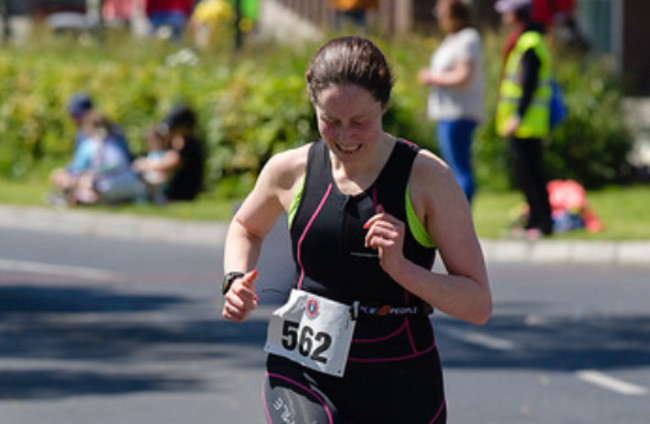IT HAS BEEN five and a half years since Eileen Ring’s life changed irrevocably.
Before November 2013, she was an upbeat 27-year-old who loved sport and soccer in particular, lining out for local club Douglas Hall in her native Cork. What has happened since has not been easy to come to terms with.
Her spiral began when, while working for An Garda Síochána, she was the victim of an assault. Initially, she thought the neck and back injuries suffered were not any worse than previous setbacks, but in an early 2014, Ring’s “naivety” began to dissipate and the gravity of her situation became apparent.
“I realised that this isn’t something where I’m going to wake up and get better,” she tells The42. “I couldn’t move. I was lying flat on my back all day. I had Netflix nearly watched out. I was with my partner and she’ll tell you that I didn’t come up to bed at night. I stayed on the floor. If I needed to be going to the toilet, she’d have to be giving me a hand. If she was working during the day, my mother would be down to give me a hand.
[It was difficult] even for something as simple as sitting in a car. At the time, a lot of my friends would have played rugby at a good level. The Six Nations would have been on and you’d be going out to try to support the girls. It just wasn’t feasible. I remember going out to one of the games and you’d stay in the car for the entire game.”
Gradually, the outlook became better. It was when Ring began seeing a pain management specialist, Dr Liam Conroy, that she “started to see little bits of life”. However, just as she was making significant progress physically, her mental health deteriorated. Nearly a year after the assault, she had “a full-on breakdown”.
“I’d be quite an outgoing person. People expect that of you and that’s the way I was and even when I was in pain, I would try to keep that sunny side up.
“In retrospect, it was the entire event and the impact the event had on me, having to adjust to that. The loss of what my life was and my identity was: ‘This is Eileen, she’s a guard and she plays football.’”
There were numerous dark days during this traumatic period. One occasion that stands out saw Ring ending up in South Doc – a service in Kerry and Cork where people with urgent medical needs are catered for.
“I woke up at 3am. I woke [my wife] Nicole and told her: ‘You need to ring an ambulance, because I’m dying.’ She was like: ‘You’re okay, catch your breath.’ I said: ‘You’re not listening to me, I’m having a heart attack.’ We look back now and laugh at it. Of course, it’s ridiculous, but in that moment, I was convinced I was dying.
“After that anxiety attack, I was out of work for about five or six weeks. I was totally and utterly drained.”
In addition, before recommencing her training in 2017, Ring was told by one doctor that she would never run again on account of her back problems.
“I didn’t go back to that specialist again. I can see now that’s an insane thing to tell anybody, and it certainly didn’t help me at the time.
“I made it clear from day one, it can’t be a case of: ‘I can’t do anything.’ That can’t be an option. We need to do something that’ll allow me to do something eventually.’”
Subsequent help with the rehabilitation from John Corr and Laura Dorgan in the Fitnessworx Gym on Tramore Road has proved enormously beneficial.
“There are hundreds of people in there who’ve been told they can’t do anything. I’m working with them and they’re all fine,” she adds.
“When I started, I was lifting very small weights. That enabled me to build up my core, which obviously helps my back. That probably should be said from day one, especially with back pain and neck issues. Everybody has back pain or has struggled at some point. You’re kind of told to do nothing, whereas if you can build up all around it, that makes it so much easier. It wasn’t until I met [John] that I thought, you can build up around all your problem areas in your neck and back.”
After a bleak few years, Ring now feels she has “come out the other side”. That is not to suggest, however, that her problems have disappeared.
“I can have bad panic attacks,” she explains. “I can always bring myself down a little bit if I know it’s coming on. ‘This is just a panic attack, you know you’re not dying.’ I have more of a rationale side of my brain that can kick in. It’s going to pass, it’s going to be okay and everybody that’s around me, if I’m with somebody, I’ll just say I’m a little bit panicked now. They’ll know you’re going to be okay.”
Moreover, the specialist’s suggestion that Ring would never run again has proven to be inaccurate.
“On the treadmills, you could literally see down on the track [at the Mardyke]. Marian and Rob Heffernan would train there an awful lot. I would say: ‘The lads there outside are training for the Olympics. This is as good as it’s going to get for me.’ [My physio] said: ‘I guarantee if you work hard enough, you’ll be out on the track,’ and I train there twice a week now. It’s one of those things I look back on and go: ‘You were right.’”
Back in November, Ring participated in her first 10k as part of the ‘Run in the Dark’ event. Two weeks ago, she completed another significant milestone in her recovery. Having been toying with the idea since last year, she competed in her first-ever triathlon.
“I was a bit of an emotional wreck afterwards,” she recalls. “My aim was if I came in under two hours, I’d be delighted. I was able to come in well under what I was hoping to do it in.”
And her sporting pursuits are not restricted to individual events. Although she can no longer play contact sports such as soccer, Ring remains heavily involved in the game. The 32-year-old regularly attends matches for both men and women’s Cork City teams, while she has worked as a coach for the latter. She is also involved with FORAS, the Leesiders’ supporters trust. And these days, she is also back coaching at Douglas Hall.
In addition, not content simply with having successfully undertaken the triathlon, Ring is set to participate in next month’s half-marathon in Cork. All funds raised from these endeavours will support Pieta House, a non-profit organisation devoted to preventing suicide and self harm.
I’m lucky that I work a full-time job and my wife works a full-time job. I have private health insurance. I was able to get in to see people straight away. I never had to wait. I’m very aware that’s a very privileged position to be in and I’m also very aware of how expensive treatment is.
“I have some friends who’ve used Pieta House. I couldn’t speak more highly of them. They provide a free service and I know more than anybody, I work full time and I was still [under pressure] trying to pay for treatment and medication.
“Times are tough and not everyone has money to donate. Hopefully, I can get a few bob over the next few weeks with the marathon approaching. If that means one person can get the treatment they need, for me, that’s a very humbling thing.”
You can read Eileen’s blog here and donate to her Pieta House Fundraiser here.
Need help? Support is available:
- Samaritans 116 123 or email jo@samaritans.ie
- Aware 1800 80 48 48 (depression, anxiety)
- Pieta House 1800 247 247 or email mary@pieta.ie (suicide, self-harm)
- Teen-Line Ireland 1800 833 634 (for ages 13 to 19)
- Childline 1800 66 66 66 (for under 18s)
















What an uplifting and powerful story. Hero.
genuinely well done so nice to read, panic attacks are dreadful
Fair play to you!!!
Well done Ringy. As a certain song says “Still it ends alright”
Jesus well done
yep
Incredible perseverance and determination.